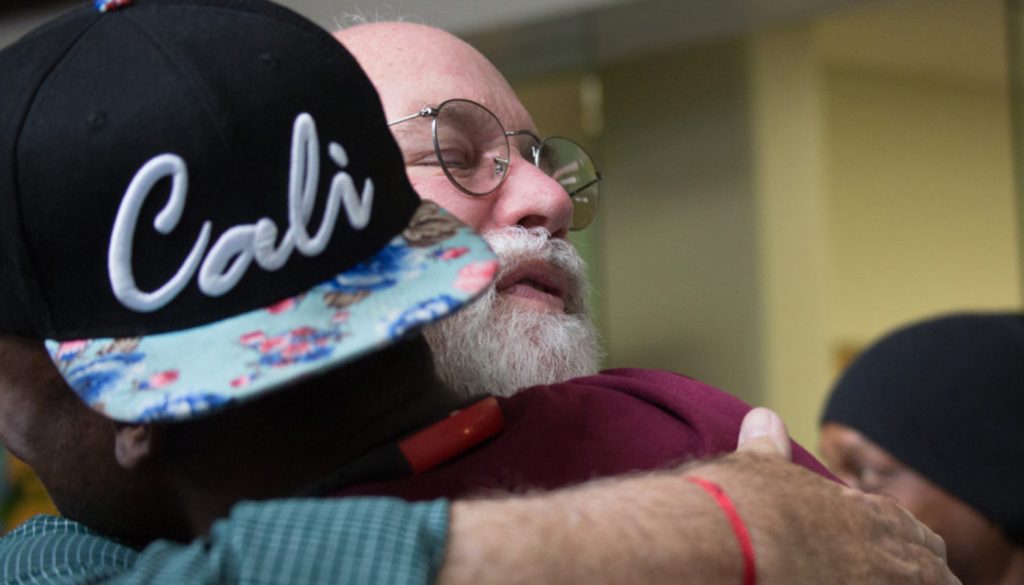“I’m now taking responsibility to be a dad.” “Now I have higher hopes for myself.” “Now my mom has the son she always wanted to have.” “I love this place.”
Those were among the quotes written on cards hanging on a photo collage of young people, exhibited on a hall of the J.W. Marriott Hotel at L.A. Live, site of Homeboy Industries’ 11th annual “Lo Maximo Awards Dinner” fundraiser on April 27.
The “place” in the last quote above referred to what has become, in the last 25 years, a solid terrain of peace and love for many youth who had remained at war and desolation in the so-called “concrete jungles” of Los Angeles, surrounding the luxurious hotel.
For 25 years, Homeboy Industries has served a population comprised of individuals some would describe as “troubled,” but who have worked to turn their lives into something productive. Today, Homeboy Industries is a $14 million gang intervention, rehabilitation and re-entry program, the largest of its kind in the country. Among Homeboy Industries’ free programs are tattoo removal, legal services, and mental health services. It operates seven social enterprises that serve as job-training sites, including Homeboy Bakery, Homegirl Café and Homeboy silkscreen and embroidery. In turn, it has produced 40 different programs nationwide, giving birth to the Homeboy Network, which is “tactically assisted” by Homeboy Industries, according to Jesuit Father Greg Boyle, founder of the pioneering program.
In a recent interview with Jesuit-run America Magazine, Father Boyle described Homeboy as a “community of healing, therapeutic,” where gang members are able to “re-imagine and re-identify with who they are in the world and then they can leave Homeboy.”
The program outgrew even Father Boyle’s initial expectations (“We never had a vision or a business plan, everything just evolved”). Today it serves 15,000 people per year from its location in downtown L.A.During the April 27 Mass in a packed hotel room, Father Boyle shared humorous and thought-provoking anecdotes involving former gang members he serves, while the choir — formed by mothers and members of the Dolores Mission community where the Homeboy seed was planted — sang liturgical songs in Spanish.One such anecdote involved taking a former gang member on his first airplane trip to a conference. The gang member told the priest that being on the plane, he felt “like I am somebody.”
“God, who loves so much, wants to make a homeboy [flying] on a plane [for the first time] feel like somebody,” said Father Boyle. “He lights up the sky. That’s what we’re invited to do: to love in a way that we light up our whole sky."
More than 2,000 people, including the “homeboys and homegirls,” filled a hotel ballroom, where Tom Vozzo was formally introduced as the program’s new chief executive officer, having served in the role for the past five months. Vozzo called Homeboy a place where “we get the mission delivered,” by “transforming one individual at a time.”
Father Boyle continues to speak around the country as he raises funds for Homeboy, where his involvement continues although on less of a daily basis than before. A staff led by Vozzo runs daily operations; half of it is formed by former gang members who Father Boyle praised for “taking ownership” of the program.At the anniversary dinner — whose hosts included journalist Lisa Ling and actor Jimmy Smits — participants saw evidence of the “transformations,” as when Richard Cabral, a former incarcerated gang member-turned-actor (he has acted in five Hollywood films and numerous television movies), entertained the audience with his first monologue/memoir sprinkled with flashbacks of abandonment and despair, mixed with hope and transformation.
Cabral spoke about how youth like him are born in rundown neighborhoods in East L.A. to parents who arrived in the U.S. pursuing the American Dream — and, after suffering abandonment and physical abuse, end up building “layer upon layer of rock [in their hearts] until they are untouchable.”
He praised Father Boyle for becoming his paternal figure after he joined Homeboy. He worked first in cleaning and maintenance, and later became one of Homeboy Bakery’s chefs, until a Hollywood crew arrived seeking youth they could cast for a movie depicting L.A. gangs.
Cabral was honored as Homeboy “hero of the year,” along with educator and volunteer June Kizo, and actors and volunteers Anjelica Huston and Martin Sheen, who received the Lifetime Commitment Award. Huston and Sheen — who served as the fundraiser emcees for several years — were not present, but expressed their gratitude and praised Homeboy and Father Boyle through a video presentation.
“We are in a perpetual state of transforming,” said Cabral, referring to the homeboys and homegirls. “And you are critical in our process of transformation,” he told participants, many of whom have been regular contributors to the cause that saves about $50 million to L.A. County and similar amount to the state of California, said Father Boyle, citing a UCLA study.
“God is expansive; he doesn’t put us in debt,” Father Boyle told the assembly. “Let’s hope to imitate this God who is too busy loving us to be disappointed.”

